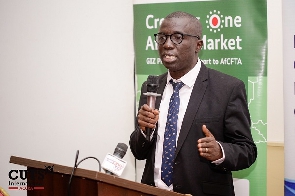 Mr Appiah Kusi Adomako, The West African Regional Director, CUTS International, Accra
Mr Appiah Kusi Adomako, The West African Regional Director, CUTS International, Accra
A leading research and public policy think tank, CUTS International, Accra is calling on government and various financial institutions to provide trade finance support to Ghanaian Small Medium Enterprises (SMEs) to help them increase their productive capacity, improve innovation, meet certification standards, research and develop new products to fulfil the demands of the growing market and take advantage of the AfCFTA.
Speaking at the 3rd CUTS-GIZ Public Private Dialogue on the theme “Creating SME Competitive Advantage for AfCFTA; The Strategic Role of Trade Finance”, organized by CUTS with Support from GIZ, the West African Regional Director for CUTS International, Mr Appiah Kusi Adomako explained that with the commencement of trading under AfCFTA in January 2021, there is the need to make Ghanaian SMEs competitive through specially designed trade finance scheme.
“Businesses and SMEs require finances to be able to improve their service delivery to fulfil the demands of the growing market and AfCFTA. However, most of these SMEs in Ghana, similar to other African countries, face obstacles when trying to get trade financing, hence the call on government and financial institutions to support SMEs,” Mr Adomako opined.
He added that access to trade finance is listed as one of the biggest problems that SMEs in Ghana must deal with. while firms in South Africa, Tunisia, Egypt, Morocco, and Mauritius are borrowing under 10% per annum, SMEs in Ghana are borrowing above 35% which means that Ghanaian exports under the AfCFTA will not be competitive.
Mr Adomako explained that “the AfCFTA presents a rare opportunity for businesses across the continent to be able to export goods, largely quota-free and duty-free. On the parallel side also, member countries can equally import from one country to the other without any quantitative restriction. Even if an SME is unwilling to export under the AfCFTA agreement, it must ensure that it is competitive at the local market as it can face competition from other African imports.”
Mr Adomako emphasized that “the establishment of the Development Bank Ghana (DBG) by the Government of Ghana, aimed at providing long-term and competitively priced loans to SMEs who have long struggled with the problem of access to finance to ensure that SMEs are better financed in critical sectors of the economy.
While I commend the government for this great initiative, there is a need to create a good and friendly business environment and tailor-make policies and initiatives for the private sector, to guarantee SMEs have access to trade financing to support the growth and expansion of their business to other countries”.
On his path, the Technical Advisor at the GIZ Trade Hub, Mr James Amisssah Hammond underscored the critical role SMEs play in the success of the AfCFTA and their contribution to Ghana’s GDP and trade.
He explained that GIZ has conducted several training programs on the AfCFTA, rules of Origin to build the capacity of the SMEs and improve their knowledge and awareness of the Agreement.
He emphasized GIZ’s commitment to supporting SME development to unlock their potential to position them to benefit the AfCFTA.